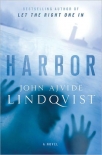Harbor by John Lindqvist (no david read aloud TXT) 📗

- Author: John Lindqvist
Book online «Harbor by John Lindqvist (no david read aloud TXT) 📗». Author John Lindqvist
And if things went very badly, if the fragile boats that had set out to gather in the nets ran into a strong wind, what chance was therefor the crew to communicate the fact that they were in distress? The most they could hope for was that God would hear their cries, and his readiness to help was somewhat capricious.
But they did their best. When it seemed as if all hope had gone, when the crew were lined up along the gunwale to stop the waves crashing over the deck, they would sometimes make lists of the promised collections that would be taken up when they came ashore, if they ever came ashore. Sometimes God allowed himself to be persuaded, and the lists would be read out in church the following Sunday and the collection would be taken.
But it wasn’t a reliable method. Many notes detailing extensive promises of contributions to the glory of God sank to the bottom with those who had made them. Incomprehensible, one might think. But Our Lord is no businessman.
Yes, life as a herring fisherman was a risky business in the olden days, but sometimes it could be very rewarding. Entire families moved to the outer islands during the summer, spending a few months laying, gathering in and checking their nets. The herring were salted in barrels and stored away, and later in the autumn they would be transported home and sold.
Sweden is built on salt herring. What did they use to feed the army, what did they give to the foreigners who came to build churches, and to other workers? Herring, that’s what! And what kept those who lived on the coast alive during the dark winter months?
Exactly. Herring.
People were so afraid of upsetting this valuable fish that the official document of the harbour guild states, ‘Any person who shows disrespect towards any fish, and calls it by an incorrect name in a spirit of contempt will pay a fine of 6 marks’.
The silver of the sea. It had to be brought up, and that involved risk. But people looked for opportunities to stack the deck, so to speak. To reduce the risks and be able to feel secure.
Anna-Greta’s story took place many hundreds of years ago. The area that today comprises Nåten was still partly under water. Domarö with its surrounding archipelago made up the outermost islands. This was also the site of the rock that used to be called Gåfwasten even further back in time. This was the place where people were in the habit of leaving gifts for the sea, after, for example, a successful trip across to Åland and back.
Exactly how the next phase began is shrouded in darkness. It is possible that someone might have got stranded on Gåvasten and been swept away into the waves, or simply disappeared. At any rate, people noticed that after this event the catches improved significantly, and the sea remained obliging all summer long.
It made people think.
The following summer, an insolent young man who had no time for superstitious nonsense declared that he was willing to be left on Gåvasten. He was provided with sufficient food and drink for a week, and if nothing had happened during that time, someone would come and rescue him.
They left the young man on the bare rock, rowed back to the fishing grounds a nautical mile or so away, and carried on laying their nets as if nothing had happened. The very next day they had the record catch of the summer, and the herring continued to pour into their nets in the days that followed.
When they returned to Gåvasten after a week, the young man was gone. They inspected the leftover food and drink, and found that it was virtually untouched. He couldn’t have spent many hours on Gåvasten before the sea took its tribute, and gave them herring in return.
And so the situation was clear. The problem was how to proceed in the future.
The catches were enormous that summer, and during the October market they were able to sell more than twice as much fish as in previous years. Come the winter, discussions were held, and this was the decision they made: since no one was willing to offer themselvesas a gift to the sea, they would simply vote. Women and children were not allowed to participate, but nor were they at risk of being sacrificed. This was a matter for the men.
Now, it would be nice to be able to tell of the heroic resignation with which the chosen person received the verdict. Unfortunately this was not the case. The voting was carried out with no mercy, and simply turned into a vote as to who was least popular in the fishing community. It was usually some angry and unreasonable individual who was selected, and the dubious honour didn’t make him any more amenable.
The victim would be hauled off to Gåvasten with something of a violent struggle, then his companions would row away as fast as they could with his curses echoing across the bay. Everybody kept their eyes down.
It came to be common practice simply to bind and fetter the victim before depositing him on Gåvasten. As the years passed, the custom was rationalised even further. No one really wanted to set foot on Gåvasten, and it turned out it was enough to chain up the victim and drop him in the sea. The desired effect was still achieved. The herring poured in, and the sea did not seek any further sacrifices.
By this stage people had settled permanently on Domarö. The pact with the sea made the population as rich as it is possible to be from fishing, and the houses were in no way inferior to those on the mainland. And yet it was not a happy island.
The annual sacrifice took its toll on the souls of the people. It wasn’t many years before they stopped





Comments (0)